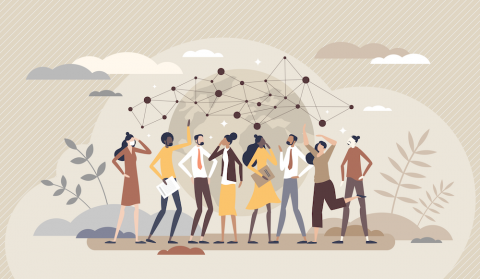Cognitive maps play decisive role in helping people learn social information, study finds

Humans are social animals. We strongly depend on forming relationships, often based on similar interests. But the vast size of our social network limits our ability to know everything about everyone all at once. How then do people learn about relationships without having direct knowledge of each person in a social network?
A new study by scientists in the FeldmanHall Lab at Brown University’s Carney Institute for Brain Science is the first to demonstrate that people build “cognitive maps” to represent an enormous amount of social information in a more flexible format. Cognitive maps have historically been studied in the context of spatial navigation, and they have been proposed to organize knowledge about where objects are located relative to each other.
The study, published on September 13 in Proceedings of the National Academy of Sciences, shows evidence that people also rely on cognitive maps to represent relationships between social features—such as race, gender and personal interests—in a network.
The study’s goal was to examine how people use social features to make inferences about unknown relationships in a social network, said senior author Oriel FeldmanHall.
“This work reveals how people build cognitive maps that don’t rely on the specific relationship between two people, but instead depend on relationships between social information, like being in a chess club and liking certain types of music,” said FeldmanHall, Alfred Manning Assistant Professor of Cognitive, Linguistic and Psychological Sciences. “It’s a really flexible format for encoding a large amount of information that goes above and beyond just single relationships in a network.”
This flexible and powerful format may shed light on more than just the relationships between social features, such as hobbies or interests. If people can learn about relationships between social features, then they can learn about relationships between social groups, the researchers said.
“The features we picked out in these studies were intentionally designed to be neutral,” said Jae-Young Son, the study’s first-author and a Ph.D. candidate in cognitive, linguistic and psychological sciences. “But in the real world, we’re likely building feature-based cognitive maps in a way that reflects points of social contention, or where social groups might have relationships with each other that might be friendly or adversarial.”
As a next step, FeldmanHall said her lab is conducting follow-up research to look at the potential benefits that are gained by having accurate cognitive maps in a social network.
FeldmanHall received a Zimmerman Innovation Award in 2019 from the Carney Institute to collect the data for this project. The research was also funded by a Graduate Research Fellowship from the National Science Foundation (2040433) and a grant from the National Institute of Neurological Disorders and Stroke (R21NS108380).



